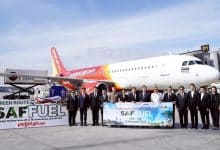Thai Vietjet takes off: Targets nearly 8 million passengers this year

Low-cost airline Thai Vietjet aims to attract nearly eight million passengers this year by enhancing aircraft utilisation and increasing flights on existing routes, with plans to introduce new Boeing 737 Max jets next year.
Thai Vietjet Chief Executive Woranate Laprabang highlighted that the visa-free scheme has significantly boosted demand on international routes, particularly to China.
The airline operates flights to over 10 Chinese destinations, both charter and scheduled, which constitute 30% of its total capacity.
Thai Vietjet’s average load factor for China routes reached 90% in the first quarter of this year, and it maintained an 80% load factor during the low season.
Despite a sluggish Chinese economy, Woranate noted that demand from high-spending Chinese tourists remains strong.
The airline also recorded an 80% load factor for flights to Vietnam, which represents 10% of its overall capacity, while domestic routes saw a 50% load factor, Woranate said.
High travel demand
“The aviation industry still faces an aircraft shortage, unable to meet travel demand. Thai Vietjet has operated with the same 18 jets for the past two years.
“Our strategy is to maximise our aircraft utilisation rate to 12 hours this year, up from 10.5 hours last year.”
The airline’s fleet includes the Airbus A320 and A321 series. To address high travel demand in the fourth quarter, Thai Vietjet plans to lease two more A320 aircraft via a short-term contract.
Pinyot Pibulsonggram, head of commercial at Thai Vietjet, mentioned that new aircraft would primarily be used to increase flights on existing routes, particularly to China and Vietnam, as well as on a new route to Mumbai, India.
Next year, the airline anticipates receiving nine to 12 new Boeing 737 Max jets as part of its five-year plan to replace Airbus aircraft with Boeing models, said Pinyot.
“Thai Vietjet still has confidence in Boeing, despite a series of missteps in recent years.”
The new Boeing jets will enable the airline to operate over longer distances, facilitating the opening of new routes to cities in China, India, and Japan.
Thai Vietjet recently signed a memorandum of understanding with the Chaipattana Foundation to support environmental preservation and sustainability projects under the Fly Green Fund Initiative.
The airline plans to start selling local products supported by the foundation in the fourth quarter.
By 2026, Thai Vietjet aims for sustainable aviation fuel to account for 1% of its total fuel consumption, with an increase of 5% by 2030.
This initiative is expected to reduce carbon emissions by approximately 153,000 tonnes over five years.
Latest Thailand News
Follow The Thaiger on Google News:


























